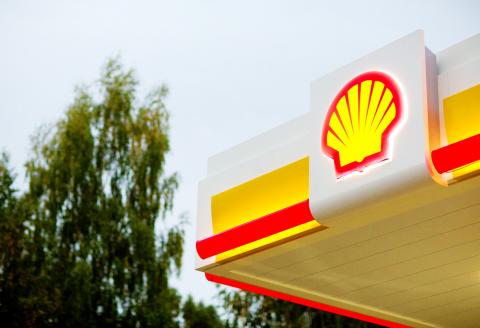China signaled its openness for business with a raft of deals that would give oil majors, including Royal Dutch Shell PLC, new opportunities to develop offshore fields in partnership with the nation’s biggest maritime explorer.
China National Offshore Oil Corp (CNOOC, 中國海洋石油) said in Beijing yesterday that it had inked oil and gas accords with nine firms.
The signing ceremony followed Chinese President Xi Jinping’s (習近平) address to Chinese Communist Party cadres marking 40 years of reform and broadly underlining the nation’s commitment to global trade.

Photo: Bloomberg
The agreements cover 64,000m2 in the Pearl River basin, to a depth of up to 3,000m.
In addition to the Netherlands-based Shell, France’s Total SA and US-based Chevron Corp were also awarded parcels.
All three majors hold existing production sharing contracts (PSCs) with CNOOC.
The other firms involved are: ConocoPhillips, Equinor ASA, Husky Energy Inc, Kuwait Foreign Petroleum Exploration Co, Roc Oil Co and SK Innovation Co.
“It’s no coincidence that CNOOC made the statement a couple of hours after President Xi’s speech,” said Tian Miao (田苗), a Beijing-based analyst at Everbright Sun Hung Kai Co (大新鴻基). “It’s only reasonable to assume this [as] one of the real actions China is taking to show the world it’s willing to open businesses to the whole world.”
CNOOC has signed more than 200 PSCs since its inception in the early 1980s, even as it has increasingly relied on its own resources to tap deep-water projects in Chinese waters — most recently the giant Lingshui 17-2 gas field in the South China Sea.
CNOOC has promised to increase spending and raise output, heeding Xi’s call for enhanced energy security as imports grow and the nation contends with the US over trade.
“The agreements will facilitate the establishment of a long-term and stable cooperation and share the development opportunities to a certain extent in the strategic cooperation areas, creating conditions for the final signing of contracts,” CNOOC’s listed unit said in a statement.
The smallest of China’s big three oil and gas firms, CNOOC is its favored vehicle for international cooperation and holds the vast majority of reserves in Chinese waters.
About three-quarters of its offshore production is conducted independently, with the remainder tied up in PSCs, including deals signed in July with Australia’s Roc Oil and Smart Oil LLC of the US.
“From a business perspective, inviting international oil companies to join domestic offshore exploration helps reduce investment risks and bring in more offshore drilling expertise,” Tian said. “It definitely helps CNOOC’s promise to quickly raise oil and gas output from domestic fields.”
Xi’s earlier address in the capital disappointed those hoping for specific policies to counter a slowing economy and show the nation’s intent to free up its markets. Instead, he focused more on the accomplishments of the Chinese Communist Party.

SEEKING CLARITY: Washington should not adopt measures that create uncertainties for ‘existing semiconductor investments,’ TSMC said referring to its US$165 billion in the US Taiwan Semiconductor Manufacturing Co (TSMC, 台積電) told the US that any future tariffs on Taiwanese semiconductors could reduce demand for chips and derail its pledge to increase its investment in Arizona. “New import restrictions could jeopardize current US leadership in the competitive technology industry and create uncertainties for many committed semiconductor capital projects in the US, including TSMC Arizona’s significant investment plan in Phoenix,” the chipmaker wrote in a letter to the US Department of Commerce. TSMC issued the warning in response to a solicitation for comments by the department on a possible tariff on semiconductor imports by US President Donald Trump’s

The government has launched a three-pronged strategy to attract local and international talent, aiming to position Taiwan as a new global hub following Nvidia Corp’s announcement that it has chosen Taipei as the site of its Taiwan headquarters. Nvidia cofounder and CEO Jensen Huang (黃仁勳) on Monday last week announced during his keynote speech at the Computex trade show in Taipei that the Nvidia Constellation, the company’s planned Taiwan headquarters, would be located in the Beitou-Shilin Technology Park (北投士林科技園區) in Taipei. Huang’s decision to establish a base in Taiwan is “primarily due to Taiwan’s talent pool and its strength in the semiconductor

An earnings report from semiconductor giant and artificial intelligence (AI) bellwether Nvidia Corp takes center stage for Wall Street this week, as stocks hit a speed bump of worries over US federal deficits driving up Treasury yields. US equities pulled back last week after a torrid rally, as investors turned their attention to tax and spending legislation poised to swell the US government’s US$36 trillion in debt. Long-dated US Treasury yields rose amid the fiscal worries, with the 30-year yield topping 5 percent and hitting its highest level since late 2023. Stocks were dealt another blow on Friday when US President Donald

UNCERTAINTY: Investors remain worried that trade negotiations with Washington could go poorly, given Trump’s inconsistency on tariffs in his second term, experts said The consumer confidence index this month fell for a ninth consecutive month to its lowest level in 13 months, as global trade uncertainties and tariff risks cloud Taiwan’s economic outlook, a survey released yesterday by National Central University found. The biggest decline came from the timing for stock investments, which plunged 11.82 points to 26.82, underscoring bleak investor confidence, it said. “Although the TAIEX reclaimed the 21,000-point mark after the US and China agreed to bury the hatchet for 90 days, investors remain worried that the situation would turn sour later,” said Dachrahn Wu (吳大任), director of the university’s Research Center for